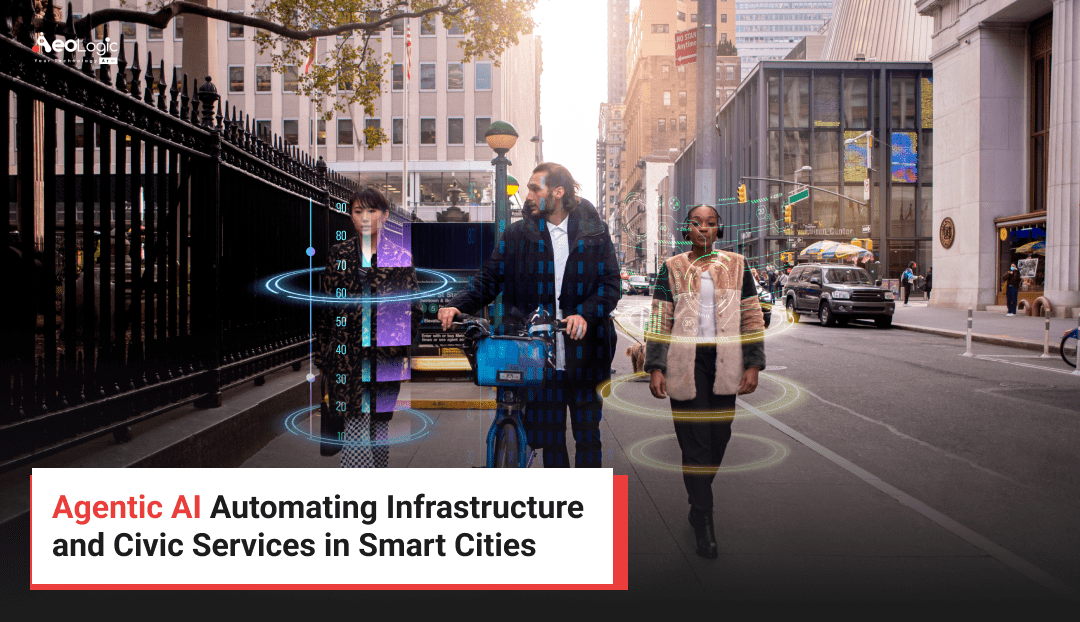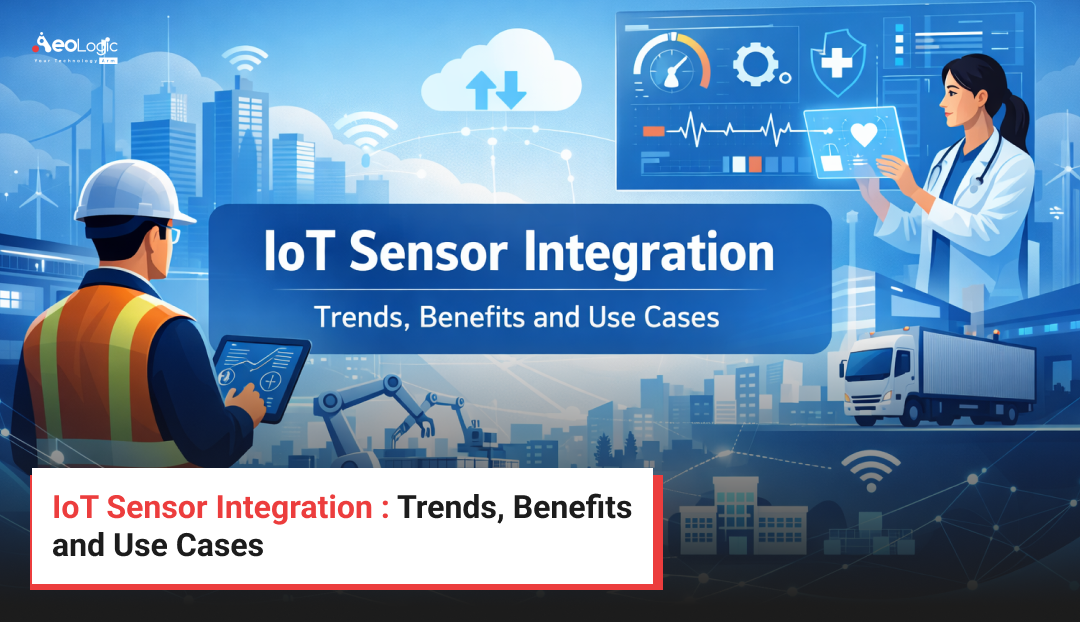Smart cities’ infrastructure comprises various departments and factors that need to be managed to grow smart cities smartly. But the traditional ways are enough to enhance the infrastructure and other aspects of development that do not establish a smart city. Civic services also play an important role in enhancing the smart cities as they are the governing body that works independently to serve the people in healthcare, transportation, judicial, education, and many other sectors.
With the conventional system, the infrastructure development in smart cities faces various challenges like poor optimization and allocation of resources, problems in adapting to real-time changes, inefficiencies, and increased cost for various aspects. But in the digital transformation, the agentic AI-powered solutions are enhancing the smart cities’ infrastructure and civic services with their autonomous solutions.
Overview
The agentic AI solutions can automate the various aspects in the smart cities infrastructure, like traffic management systems, transportation management, resource optimization and management, automate the public safety system, and much more. Where the civic services like firefighters, police, advisors, government researchers, air traffic controllers, and postal workers, etc, also get enhanced with the agentic AI automation.
The agentic AI has the potential to analyze the data and develop an autonomous, advanced, and smart system that boosts the overall efficiency of smart city development. Overall, agentic AI is a powerful tool for transforming smart cities, offering the potential to create more efficient, sustainable, and livable urban environments.
Key Statistics
- The Global Agentic AI in Smart Cities market size is expected to be worth around USD 58 Billion By 2034, from USD 1.88 billion in 2024, growing at a CAGR of 40.90% during the forecast period from 2025 to 2034. 90% of public sector organizations are planning to explore, pilot, or implement agentic AI technology within the next 2–3 years (by 2027–2028), with 45% actively piloting programs in 2025. This includes smart city applications like traffic management and public safety.
- 65% of cities globally are piloting or using AI to streamline government operations, with agentic AI playing a significant role in autonomous decision-making for civic services.
- Over 500 cities are projected to use digital twins by 2025, leveraging agentic AI to manage resources and optimize urban planning, potentially saving $280 billion by 2030 through smarter operations.
- Smart governance systems using multi-agent AI have improved administrative efficiency by 25–35% in pilot cities like Dublin, automating tasks like permit approvals and citizen service requests.
Also Read: Steps to Choose Right AI Solutions Provider for Your
What is the Role of Agentic AI in Smart Cities?
Agentic AI in automating infrastructure and civic services in smart cities generally refers to the implementation of agentic AI-powered autonomous solutions for automating tasks like public safety, traffic management, public transit automation, smart and automated governance, automating resource allocation, and automation of other administrative works.
The agentic AI has the potential to surpass conventional AI, as well as many other advances. But it does not work on predefined functions as conventional AI does. It is an independent technology that can learn and adapt, which would be beneficial in the evolving landscape of smart city development. Overall, agentic AI is a key component of intelligent urban systems due to its capacity to act independently, adjust to real-time input, and pursue goal-oriented tasks.
Also Read: Agentic AI Driving Automation and Innovation in the Manufacturing Industry
Key Applications of Agentic AI in Smart Cities and Civic Services
There are various applications of agentic AI in automating infrastructure and civic services in smart cities. Here are a few mentioned below.
Traffic Flow Optimization
Traffic flow optimization is one of the key aspects in the development of smart cities. The conventional system does not offer proper management of the traffic infrastructure, which creates challenges for urbanization. The agentic AI-powered automatic solutions can enable the analysis of traffic aspects like real-time data from different sources, such as cameras, sensors, and much more. This helps to analyze traffic congestion, automatically adjust traffic signals, and much more, which overall enhances the smart city infrastructure.
Public Transportation Management
Transportation is another key infrastructure that can contribute to smart city development in a great manner. The conventional transportation system is not able to manage crowds, transit scheduling, and efficiency, which leads to affecting the whole system in smart cities. The agentic AI automatic solutions can automate crowd management, route networking, vehicle capacity to carry passengers, and much more to enhance transportation in the best possible manner. This also makes a great impact on the overall smart cities.
Also Read: Key Applications of Agentic AI in Energy and Water Utilities
Water and Utility Management
Utilities management and various other resource management are crucial as they should be used with better utilization and optimization. Conventional infrastructure management systems are not able to manage inefficiency. The agentic AI solutions can detect various water aspects like leakage in pipelines, sewer issues, and much more to manage water efficiency. Also, agentic AI-powered autonomous systems can enhance other utilities like grid systems to smooth the flow of energy with better optimization than ever before.
Public Safety and Surveillance
Another key infrastructure of smart city development is public safety and surveillance systems. The conventional system does not offer advanced security systems to enhance public safety from various incidents like theft, assault, etc. The agentic AI-powered system can integrate with the cameras, public surveillance systems, and other security systems to create a smart and intelligent system to enhance public safety. It generally detects any unusual activity and automatically triggers the warning system.
Also Read: The Future of Agentic Process Automation
Automated Administrative Processes
Various administrative processes like permit applications, license renewals, claims processing, etc, are key services for the public that need to be managed efficiently to provide convenience for the people. But the conventional system does not enable that kind of facility. The agentic AI integration into civic services can automate various public administrative services like permit applications, license renewals, and claims processing. This eliminates the middleman and agent’s needs, which saves a lot of money and time for the public.
Citizen Engagement Platform Development
Citizens always face various problems in solving their queries related to their city. This is the duty of civic services to answer queries. But the conventional civic services do not act smoothly. Where the agentic AI-powered different engagement platforms like AI chatbots, AI assistants, etc can provide the answer to the citizens’ queries. This reduces the burden for the civic services departments, allowing them to focus on other key tasks. This overall improves the smart city development and the efficiency of civic services.
Emergency Response Coordination
There could be various emergency situations like fire, accidents, natural disasters, and much more that need to be managed with the civic services like police, fire, and other departments. But conventionally, it often leads to a delay that results in potential loss of lives and infrastructure. The agentic AI-powered autonomous solutions can immediately detect or analyze any potential issues and enable emergency response systems. This helps civic services take action immediately to prevent any type of damage.
Transparency Governance and Decision Support
Governance of various things and aspects should be transparent in smart city development. Also, the decisions taken by the government should be supported by facts and reasons. The agentic AI autonomous solutions can enhance transparency by providing insights about the related aspects, such as budgeting, resource allocation, and urban planning, that foster transparency and accountability in governance. This enhances the trust among the citizens and the civic services department.
Also Read: How AI Agents Are Improving EHR/EMR Systems in Healthcare
Challenges in Implementing Agentic AI in Smart Cities
Agentic AI has the potential to increase the smarter and more productive functioning of cities. It assists in the management of traffic, energy, public safety, and so forth. But using agentic AI also brings challenges and ethical issues.
These challenges have to be openly discussed, so citizens are protected, and agentic AI is used fairly.
1. Data Privacy and Surveillance
Smart cities collect and store vast amounts and types of data. The data comes from various things like cameras, sensors and all devices connected to a smart city network. Agentic AI utilizes this data to make decisions.
However, it brings up privacy concerns. This includes concerns like, “I’m being watched too closely” and so on. Without safeguards in place to reconcile the differences, there is concern for misusing data or worse, violation of one’s human rights, which would result in loss of trust from its citizens to a city official.
2. Algorithmic Bias and Fairness
Agentic AI uses data to learn. If this data has bias, there is a chance the system will propagate that bias.
For example, the system may disproportionately target certain groups in policing or social services, which could increase inequality. It is important to scrutinize AI systems for bias, and fairness should be incorporated into the design and deployment of AI systems.
Also Read: Boost Machinery Manufacturing Efficiency with AI Agentic Solutions
3. Accountability and Transparency
When agentic AI makes decisions independently, it is hard to tell who is responsible. If something goes amiss, is it the AI developer, the city, or the AI?
We do need to figure this out because the ambiguity is a huge problem. Achieving transparent processes for understanding how decisions are made is important. Definable accountability must also be in place.
4. Security and Vulnerability to Attacks
Agentic AI-powered smart city infrastructure will be subjected to cyberattacks. A breach could disrupt essential services, impact data integrity, or enable an attacker to maliciously manipulate AI behavior. When implementing agentic AI solutions in the city’s infrastructure, cybersecurity will have to be robust, ongoing, and monitored continuously to help protect the urban smart system.
5. Ethical Use and Social Acceptance
Agentic AI implies we can have AI systems that will work in sync with societal values and ethical considerations.
Consent and human autonomy can quickly become issues, and automated job loss can become relevant. Cities will need to involve the community in shared expectations and desires for implementing AI, including all stakeholders, to include human rights, inclusion, and gain true community acceptance.
How cities work through these challenges with intention, equity, and compassions will be important in maximizing the anticipated benefits of agentic AI in smart cities, without diminising citizen rights and welfare.
Cost of Agentic AI Solutions for Smart Cities Development
The cost of agentic AI solutions for smart city civic services in 2025 ranges from $20,000 for basic chatbots to over $1,000,000 for advanced multi-agent systems, with annual maintenance costs of $5,000–$200,000. Simple systems for tasks like answering routine citizen inquiries or automating basic administrative processes (e.g., permit status checks) can cost between $10,000–$40,000.
Systems with NLP, context awareness, and integration with city databases for tasks like processing service requests or analyzing citizen feedback can range between $40,000–$120,000. The cost figures provided are estimates and can vary based on specific project requirements and chosen technologies.
Also Read: Top Benefits of Using AI Agents for Smarter Logistics Aggregation
Final Words
The agentic AI-powered autonomous solutions are gonna enhance the smart cities’ development by revolutionizing their infrastructure automation and civic services advancement. The agentic AI solutions have the potential to understand the demands of the changing landscape and people and make changes according to the situation. These learn and adapt features are great; they surely make the development of smart cities evolve to success.
With advancements in the digital landscape and decentralized platforms influencing the future of urban living, agentic AI will be essential in developing resilient, sustainable, and responsive urban settings as cities change.
Are you prepared to revolutionise your business? The future belongs to those who create it now, so schedule a free meeting with our AI specialists to create a customised Agentic AI roadmap.
Also Read: What Are the Benefits of Agentic AI in Real Estate
FAQs
Which infrastructure areas benefit most from agentic AI automation?
The deployment of agentic AI automation can create major enhancements in numerous infrastructure sectors of smart cities. Here are a few examples:
- Transportation Systems: Traffic signals driven by AI knowledge; smart parking and public transportation scheduling resources, and using AI data science input to optimize flow can help reduce congestion.
- Energy Distribution Grids: AI’s automated monitoring and adaptive control of energy is making distribution networks more efficient and reliable.
- Water Safety Management: Though it is possible to leverage AI systems to detect leaks, manage water distribution, and forecast water demand, this can make water resources more secure and safely utilized.
- Waste Management Systems: AI monitoring and control systems using intelligent sensors and an AI dashboard to monitor and control transport/logistics can self-optimize the routes, collection schedules, reduce costs, and emissions.
- Public Safety Infrastructure: Public safety infrastructure that can efficiently deliver safety, for example, simply collecting AI data and using it to control AI surveillance or AI equipment for emergency response can allow for better situational awareness (threat detection) compared to humans monitoring activities and deciding on the next steps in an emergency situation.
- Building Facilities Management: Automation of building system components, like HVAC, lighting, and security systems can optimize energy use, and help keep building occupants safe.
The challenges of automating critical infrastructure areas is essential for helping cities create and become more sustainable, resilient, and responsive to residents.
How does agentic AI contribute to traffic management in smart cities?
Agentic Artificial Intelligence revolutionizes traffic management by continuously analyzing data from cameras, sensors, and connected vehicles and making autonomous decisions that ensure optimum traffic flow.
It can dynamically change traffic signal timing based on observed congestion patterns, predict and mitigate bottlenecks, and reroute vehicles to minimize delays. Furthermore, AI-based systems manage smart parking, routing drivers to available spaces reducing search times and emissions. Ultimately improving travel time, reducing congestion, and enhancing air quality.
Can agentic AI help optimize energy consumption in urban areas?
Agentic AI is essential for improving urban energy use by managing smart grids and building energy systems.
It continuously tracks real time energy use, forecasts usage fluctuations and automatically adjusts supply needs, optimizing consumer load without human intervention. AI will enable better integration of renewable energy more efficiently by predicting availability (e.g., solar, wind) and storage needs.
In buildings, agentic AI is not only more effective in managing occupancy, it controls heating, cooling and lighting systems contextualizing based on real time occupancy use and capacity, thus eliminating inordinate energy waste and billions in costs.
What are the security risks of using agentic AI in smart city systems?
In smart cities, there are some risks associated with agentic AI. Hackers trying to damage smart systems and to make better decisions through agentic AIs.
Personal data collected by the AI and other smart services could be hacked, acquired inappropriately, or shared without permission. In some cases the AI may even be tricked to make bad decisions by bad actors.
A failure in the AI could affect multiple city services at once. It’s also possible that a person with access to the AI might use that access for some other purpose.
Security, such as electronic security, inclusion of backups, use of encryption, regular auditing, and security on access rights facilitates the secure introduction of agentic AI.

I’m Deepika Pandey, an SEO strategist and content writer with 6+ years of experience. I create SEO-friendly content that drives traffic and engages readers. I combine data insights with creativity to help businesses grow their online presence effectively.







